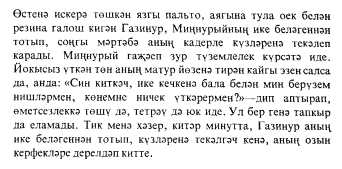
Worldwide shipping, since 1992!
View Cart
| About Us | Contact Us |
 |
Hundreds of Languages, Thousands of Products Worldwide shipping, since 1992! |
View Cart |
|
|
|||
| Languages | > | Tatar | Tweet |
Tatar, also spelled Tartar, is spoken both in European Russia and in Siberia. Its 5 million speakers are divided into a number of branches, the most important being the Volga Tatars, who inhabit the lands drained by the Volga River and its tributaries The greatest concentrations of Volga Tatars are in the Republic of Tatarstan (capital: Kazan), where they number about 2 million, and in the Bashkorstan (capital: Ufa), where they number about one million. A second branch of the Tatars consists of the Siberian Tatars, who number about 100,000 and live in western Siberia. Tatar is spoken/used in the following countries: Bashkortostan, Kazakhstan, Russia, Tatarstan. Language Family

Wearing a shabby spring coat, country-style overshoes, and woolen stockings, Gazinur held Minnuri's hand in his, and looked into her dear eyes for the last time. Although the sleepless agonizing night had left a trace of sadness of her pretty face, she showed no signs of dispair or confusion. In her loving look there was no suggestion of the usual question in such situations: "What will I do without you, alone, with two small children? How will I live?" Only now, at the moment of saying goodbye, when Gazinur took Minnuri in his arms, did her long eyelashes begin to quiver. | |||||||
|
©1992-2025 World Language Resources, Inc.
All Rights Reserved.
2390 Crenshaw Blvd., #813, Torrance, CA 90501 USA Tel: 424-328-0063 About Us | Contact Us | Privacy Policy | Help Browse: Languages | Product Types | Countries |